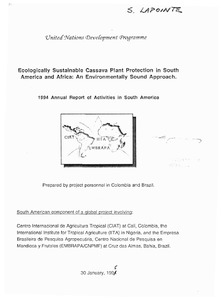Project GLO/91/013 Annual report 1994 Ecologically Sustainable Cassava plant protection in South America and Africa: An Environmentally Sound Approach
Property rights and soil fertility management in Niger
This research was undertaken as a Ph.D. dissertation (Stanford University) in conjunction with the ILCA programme in Niamey, Niger. The objective of the research was similar to that of the World Bank studies: to test how land tenure affects land-improving investment, agricultural productivity and resource management. The standard hypothesis is that land tenure that is non-exclusive insecure or non-transferable will lead to under-investment and depressed factor mobility.
Relevant policy questions related to property rights and resource management
The authors started the discussion with the fundamental question: why are property rights important? The central hypothesis of this collaborative venture is that inappropriate property rights institutions lead to resource degradation. Two cases were distinguished: single-user resources and multiple-use resources. A good example of a single-user resource is land. Absence of secure property rights will result in land degradation, as incentives to improve the resource base do not exist under such conditions.
Shared Control of Natural Resources (SCOR) spatial database for planning and monitoring resource use change
Shared Control of Natural Resources (SCOR): information technology for policy analysis and change in sustainable integrated watershed resources management
Shared Control of Natural Resources (SCOR): SCOR progress, 1st quarter 1994
Shared Control of Natural Resources (SCOR): SCOR progress, 2nd quarter 1994
Shared Control of Natural Resources (SCOR): SCOR progress, 3rd quarter 1994
The Borana plateau of southern Ethiopia: Synthesis of pastoral research, development and change, 1980-91
This document is divided in eight chapters. The first chapter reviews rangelands and rangeland development in Ethiopia. The second chapter is an introduction to the Borana Plateau with ref. to natural resources and pastoral society. It reviews secondary information on geology and sociology, as well as original information on climate, soils, wildlife, plant ecology and water resources for the central Borana Plateau. Chapter three deals with vegetation dynamics and resource use.




